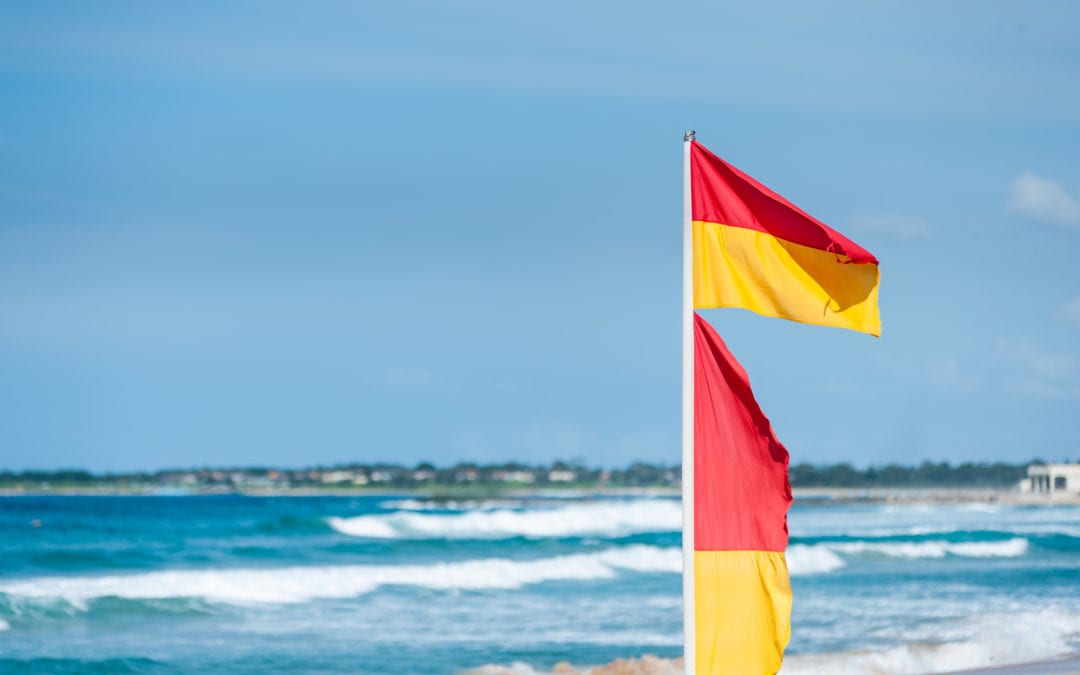Summer is full of warm days, long evenings and outdoor fun. Whether you are soaking up sun at the beach, splashing in a pool or just hanging out in your backyard, staying safe is an important part of any activity. The following information can help you stay safe while you have fun this summer.
Weather
Always check the weather before heading to the beach, pool, lake or woods. Lighting and water don’t mix, so avoid swimming if there is lightning in the forecast.
Swimming Skills
Knowing how to swim makes a big difference; don’t get in the water without a life jacket if you can’t at least doggie paddle. Always have a buddy with you when swimming; don’t swim alone. Remember that ocean swimming is different than other swimming, and you should always be prepared to handle strong surf and currents.
Lifeguards
When swimming at a beach, stay close to where lifeguards are stationed. Always follow the instructions of lifeguards.
Rip Currents
Rip currents flow away from the shore and are strong enough to pull even strong, expert swimmers to sea. Avoid rip currents by watching for their signs, including a channel of choppy, churning water; seaweed, foam or debris steadily moving seaward; noticeable difference in the color of the water; and a break in the pattern of incoming waves.
If you get caught in a rip current, remember the following:
- Stay calm and avoid trying to fight the current
- Swim parallel to the shore to escape the current
- Once free of the current, swim toward shore
- If you can’t make it to the shore, wave your arms and call for help
Warning Flags
Different states and beaches can have different colored flags with different meanings, so make sure to read a sign or ask a lifeguard to find out what they mean at the beach you are visiting. Usually, red flags stand for strong currents and surf, yellow flags stand for moderate and green flags stand for calm. Blue or purple flags usually mean marine life that is potentially dangerous has been spotted in the area.
Swimmers in Need
Learn how to identify swimmers in need. Besides the obvious signs of waving their hands around and calling for help, watch for swimmers with their heads low in the water or tilted back with their mouth open, whose legs are vertical in the water, who have their eyes closed or are unable to focus, and who are not making progress even though they are trying to swim.
Waves
Waves are more powerful than most people think and can cause sprains, dislocated shoulders, broken collarbones, spinal injuries and blunt organ trauma. Never turn your back on the waves when in or near the water.
Alcohol
Alcohol dehydrates you and interferes with your judgment, making you more prone to heat-related illnesses and drowning. Stay sober while enjoying time at the beach or on the water.
Ocean Life
Look out for jellyfish when in the water at the beach; many varieties discharge venom-filled stingers from their tentacles. Most jellyfish stings cause a red, painful irritated mark, but some can be life-threatening. Remove any remaining tentacles using a credit card or flat object, then rinse the area with sea water; don’t rinse with fresh water which can activate stingers. Deactivate the stinger by rinsing with vinegar or using a paste of seawater and baking soda. Soaking the sting for 20 minutes in hot water can help relieve the pain.
- Shark attacks are thankfully rare in the United States. To further reduce your risk, follow these tips:
- Avoid swimming in areas with baitfish, such as near piers or in areas used by fishermen
- Stay in groups
- Don’t swim in the dark or at dusk when sharks are more active
- Don’t enter the water when you are bleeding
- Avoid wearing shiny jewelry or brightly colored clothing in the water
- Fireworks
Even fireworks considered safe, like sparklers, can cause burns. Larger fireworks can cause severe burns, scars, blindness or death; always use extreme caution around them. It’s best to attend a community fireworks display and let the professionals handle setting off all the fireworks.
Insect Safety
The following tips can help you avoid irritating bites and potential disease from insects:
- Avoid the use of scented soaps, hair sprays or perfumes
- Stay away from areas where insects congregate or nest
- Eliminate stagnant water from your yard
- Use an insect repellent that contains DEET, then wash off the repellent when you go inside
- When outside at dusk or any time there are a lot of mosquitoes around, wear pants, long-sleeved shirts and socks
- Sun Protection
The sun can do serious damage to your skin, so protect yourself from harsh rays. Wear a broad-spectrum sunscreen of SPF 15 or higher when out in the sun, and reapply every two hours or after swimming. Stay in the shade when possible, and avoid prolonged exposure between 10 a.m. and 4 p.m. when the sun is at its peak.
Heat-Related Illnesses
Watch for the following signs of heat-related illnesses:
- Confusion
- Dizziness
- Headache
- Fatigue
- Muscle cramps
- Nausea
- Weakness
- Excessive sweating or lack of sweating
- Rapid heartbeat
- Pale skin
- Swelling, especially of the face or hands
If you notice any of these symptoms, get out of the heat and sun immediately, remove unnecessary clothing, slowly drink plenty of water and take a cool shower or bath. If symptoms are severe or do not go away quickly with treatment, seek medical attention.
Hydration
Staying hydrated is critical during the hot summer months. Always carry plenty of water and other fluids with you and drink them often.
Staying safe during summer requires a little extra care and protection, but the effort is well worth it. Take the time to protect yourself and others, and enjoy a safe, fun summer all season long.

